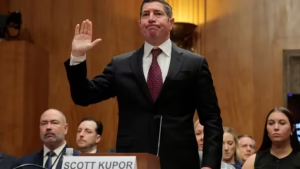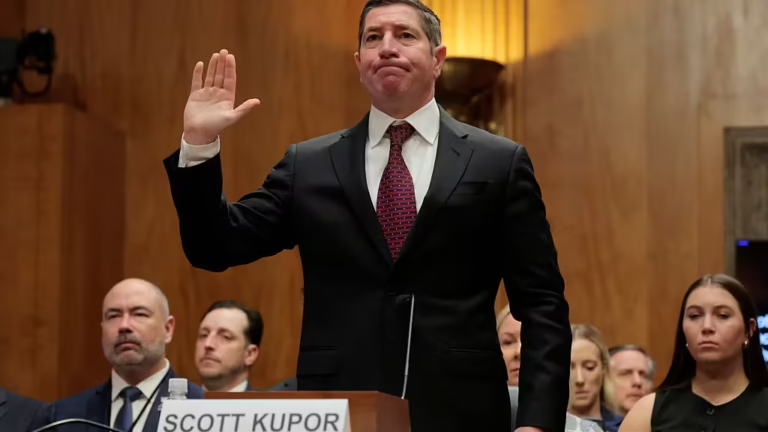Republicans Hit Major Hurdle in Push to Cut CFPB Funding
Senate Parliamentarian Blocks GOP, Republicans in the Senate faced a major obstacle Friday as the Senate parliamentarian ruled that several provisions in President Donald Trump’s sweeping tax and spending bill, including plans to defund the Consumer Financial Protection Bureau (CFPB), violate procedural rules. The ruling is a setback for GOP leadership, who are under pressure to meet Trump’s Fourth of July deadline to pass the bill.
The proposed defunding of the CFPB—a key agency created after the 2008 financial crisis to protect Americans from financial abuse—was estimated to save $6.4 billion. However, the parliamentarian determined the move breaches the Senate’s Byrd Rule, which limits what can be included in reconciliation bills that pass with a simple majority.
Democrats Celebrate Procedural Victory
Democrats were quick to hail the ruling as a win. Sen. Elizabeth Warren (D-Mass.), a key architect of the CFPB, condemned the GOP’s efforts to dismantle it.
“Democrats fought back, and we will keep fighting back against this ugly bill,” Warren said. She warned that gutting the agency would expose consumers to deceptive practices by large financial firms and threaten financial system stability.
Republicans argue that the CFPB has long overreached and should be defunded or restructured. Sen. Tim Scott (R-S.C.), chairman of the Senate Banking Committee, said his team will continue working with the parliamentarian to revise the provisions while pushing to eliminate what he calls wasteful government spending.
Trump’s Bill Faces Further Scrutiny
The massive legislation is designed to extend $4.5 trillion in Trump-era tax cuts, bolster national security with an additional $350 billion, and fund mass deportation programs. At the same time, the bill proposes to slash over $1 trillion from safety-net programs like Medicaid and SNAP (food stamps).
According to the Congressional Budget Office (CBO), the plan would increase the federal deficit by $2.4 trillion over the next decade and could leave 10.9 million more Americans uninsured.
These deficit projections could become a flashpoint as the Senate parliamentarian continues reviewing the bill. Under the Byrd Rule, provisions that add significantly to long-term deficits or are deemed “extraneous” to the budget cannot be included in reconciliation.
Other Provisions Deemed Ineligible Under Byrd Rule
The parliamentarian also ruled several other GOP proposals ineligible for the reconciliation process:
-
Limiting the Financial Research Fund, saving $300 million
-
Transferring the Public Company Accounting Oversight Board to the SEC, eliminating oversight jobs and saving $773 million
-
Changing the pay structure for Federal Reserve employees, saving $1.4 billion
-
Rolling back certain provisions of the Inflation Reduction Act, particularly those related to green energy
-
Eliminating emission standards for certain 2027 model year vehicles
-
A defense-related provision that required quarterly updates on how new funds are used, with penalties for delays
All were found to violate the Byrd Rule, meaning they would need to meet the 60-vote threshold to survive—a near-impossible task in the narrowly divided Senate, where Republicans hold just a 53-47 edge.
GOP’s Use of Budget Reconciliation Faces Tight Constraints
The GOP is using the budget reconciliation process to bypass the filibuster and pass Trump’s bill with a simple majority. But the process comes with strict limits. The Byrd Rule, named after the late Sen. Robert Byrd, prevents non-budgetary items from being passed this way.
With so many provisions ruled out, Republicans may be forced to strip controversial elements from the bill, risking support from conservative lawmakers who insisted on their inclusion.
Tough Road Ahead for Trump’s Legislative Agenda
The parliamentarian’s findings point to a rocky path ahead for Trump’s legislative ambitions. The proposed use of “current policy” instead of “current law” to project future deficits will also face scrutiny. This shift could hide the bill’s true budget impact and may be disallowed.
While the parliamentarian’s decisions are technically advisory, they are almost never overruled.
If the GOP cannot adjust the bill to comply with reconciliation rules, key portions—including the defunding of the CFPB, revisions to environmental rules, and massive cost-cutting measures—may not survive. This could splinter Republican unity and jeopardize the package altogether.
For more latest news today checkout our website: usnewsinsight












